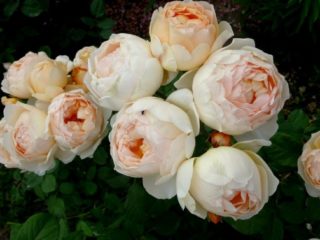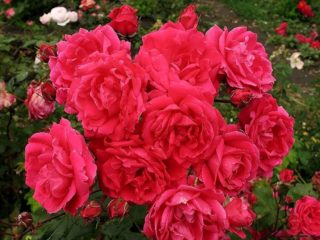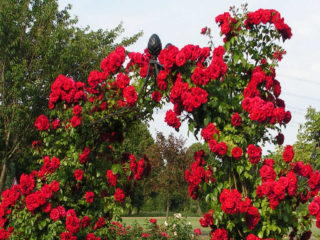Content
Rose Black Prince belongs to the hybrid tea representatives of this floral species. The variety surprises with its exotic color, for which it is known among gardeners. Rose Black Prince is one of the "old" dark-colored cultures.
Breeding history
The variety was brought to the territory of Russia from Great Britain, it conquered the aristocrats of the 19th century, who sought to decorate their gardens with an unusual flower.
Black roses began to be created by breeders in the UK. When it was concluded that a pure shade could not be achieved by combining different genes, they came up with a trick.
Taking a variety of white roses as a basis, they simply dyed the petals with a dark red dye. The unopened buds looked black.
Only the work of the British scientist William Paul was crowned with success, who received a hybrid tea variety with dark petals in 1866.
Description of the Black Prince rose variety and characteristics
The maximum height of the bush is no more than 1.5 m. In width it spreads up to 90 cm. On the shoots there are large thorns in small numbers. The branches themselves are of medium foliage, well developed.
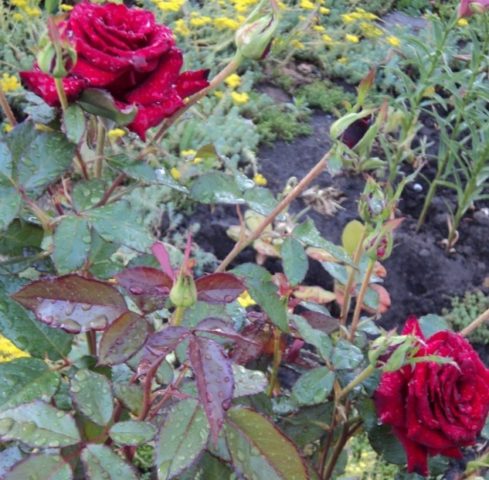
The leaf plates are ordinary, oval-elongated, with jagged edges, dark green in color
From 1 to 3 buds appear on each of the shoots. They resemble a bowl in shape. The flowers reach 10-14 cm in diameter. There are 45 petals in the bud, some of which are densely located in the middle of the flower.
In the unopened state, the roses are almost black in color. As the bud opens, it becomes noticeable that the petals have dark edges and a burgundy middle. But under open sunlight, the buds quickly fade: their shade changes to dark crimson.
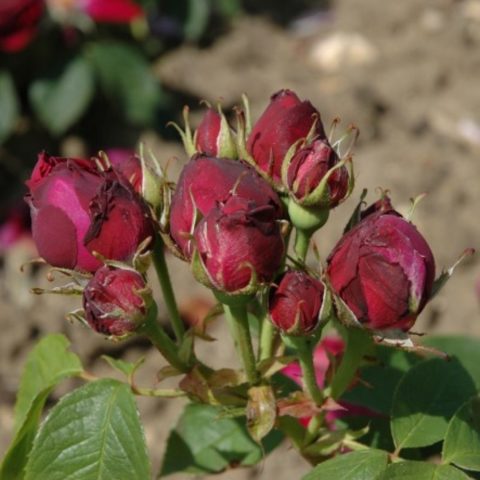
Depending on the sun, the color can appear either completely dark or burgundy.
The aroma of the black prince bush rose is intense: it is compared to wine.
The variety belongs to the group of multi-flowering. The first buds appear at the end of June and wither after 3-4 weeks. Until the beginning of August, the rose rests, and then there is a second wave of flowering, lasting no more than a month. Sometimes single buds can bloom before autumn frosts.
Advantages and disadvantages
The main advantage of the Black Prince variety is the decorative and unusual color of the petals.
Rose benefits:
- strong, tart wine aroma;
- abundant and long flowering;
- the versatility of the use of flowers (for decorating a plot or cutting into a bouquet);
- frost resistance;
- flowers retain their freshness for a long time when placed in a vase of water.
Disadvantages of the variety:
- the brushes droop under the weight of the buds, since the peduncle is thin;
- weak immune system.
If you do not take preventive measures against diseases and pests, then the bush may die. The plant needs care and feeding in order to form large, beautiful buds.
Reproduction methods
The most common way to propagate a crop on your site is by cuttings with green shoots.
For the procedure in the summer, it is necessary to prepare green, strong, young, but ripe cuttings. The length of each of them should be 7-10 cm. The upper cut must be made straight, and the lower one at an angle, just under the kidney.
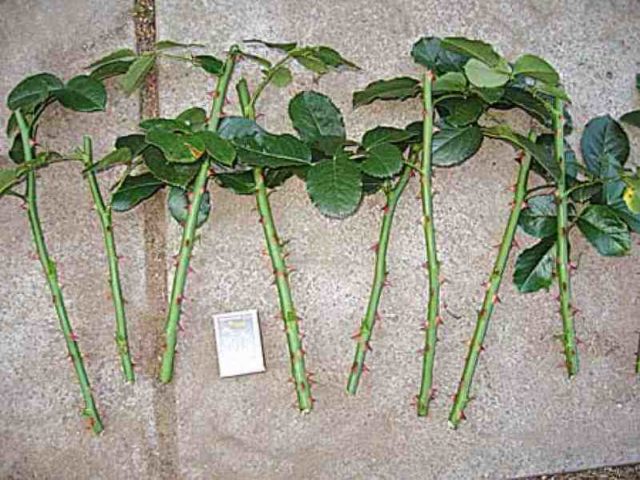
All bottom sheet plates should be removed, leaving 2-3 top sheets
The workpieces should be placed in a Heteroauxin solution for 48 hours, then planted in open ground, covered with a film on top. A transplant to a permanent place can be done only for the next year.
Relevant for roses Black Prince reproduction by dividing the bush. To do this, it is dug up and divided so that the shoot has a part of the rhizome.
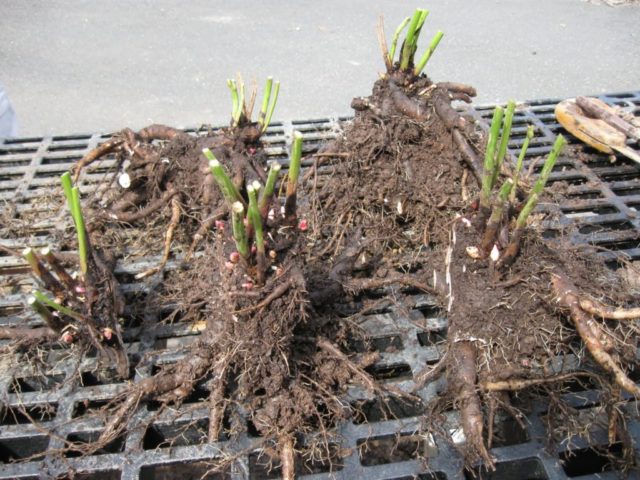
The resulting bushes should be immediately transplanted to a permanent place.
Roses over 1.5 years old can be propagated by layering. To do this, they are separated from the mother bush in order to plant them in a permanent place in the future.
Growing and caring for the black prince rose
The rose is not a flower that does not need care. If the plant is improperly planted, the plant quickly dies or is sick for a long time, does not bloom.
Seedlings should be purchased from trusted manufacturers. They must be vaccinated. Healthy specimens have several buds on the shoots, they themselves are uniform in color, without mold or damage.
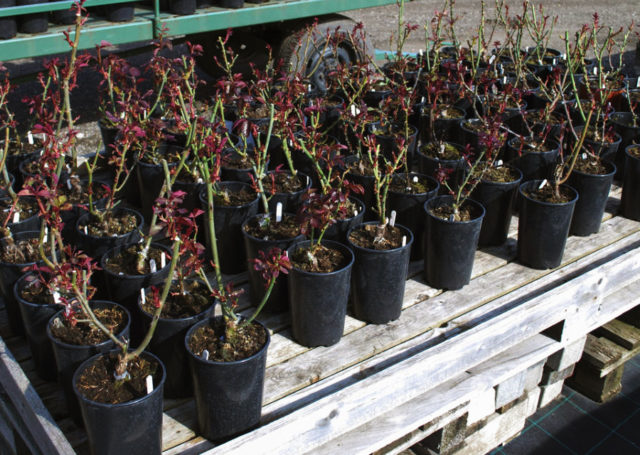
Saplings, whose root system is closed, take root more easily after transplanting into open ground
On the site, the seedling should be allocated an even place protected from the winds. The soil should be fertile, moisture permeable, with a slightly acidic environment (pH 6-6.5). If the soil is not acidic enough, then peat or manure should be added to it. With increased acidity, lime or ash is added to the soil.
Rose the Black Prince prefers partial shade: the flower has enough sun in the morning and evening hours.
Landing Algorithm:
- Dig a hole. The sizes should be selected taking into account the rhizome. The depth of the pit must be at least 60 cm.
- At its bottom, lay a drainage layer from scrap materials: expanded clay or pebbles.
- Pour 20 cm thick soil over the drainage. Pre-add 20 g of superphosphate and calcium sulfate to the soil.
- Transfer the seedling to the hole, cover the roots.
- Water the Black Prince rose abundantly, and mulch the soil around it with sawdust or bark.
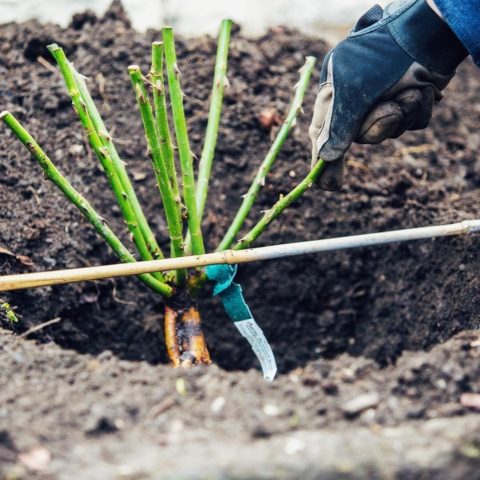
The neck should be deepened no more than 3-5 cm, otherwise it can rot during watering, which will lead to the death of the rose
Moisten the soil around the bush regularly. In the hot season, watering the Black Prince rose is required every 2-3 days. In rainy periods, soil moistening should be done once a week.
To retain moisture, the ground around the bush needs to be loosened and mulched. Weeds must be removed.
Top dressing scheme:
- Before the formation of buds, shed a complex fertilizer: dissolve 15 g of ammonium nitrate, 10 g of potassium salt and 25 g of superphosphate in 10 liters of water.
- At the end of flowering, dissolve 25 g of ammonium nitrate, 10 g of potassium salt and 15 g of superphosphate in 10 liters of water.
Rose Black Prince needs pruning twice a season. In October, a rejuvenating procedure is carried out, during which the shoots are shortened by 2-3 buds above the ground.
Sanitary pruning is carried out after the snow melts. Rotten, dried or damaged branches are subject to removal.
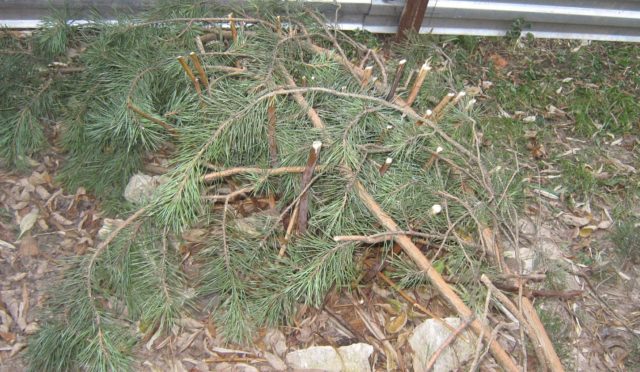
After the autumn pruning, all the foliage around the bush is removed, and the Black Prince rose itself is covered with spruce branches
Pests and diseases
Rose Black Prince does not have a strong immune system. With improper care, she is affected by various diseases. If you do not take preventive measures, then the bush can suffer from the activity of pests.
Powdery mildew appears as a white coating that covers the entire plant. The affected leaves gradually fall off, the buds lose their shape and color. Without treatment, the rose bush Black Prince will die.
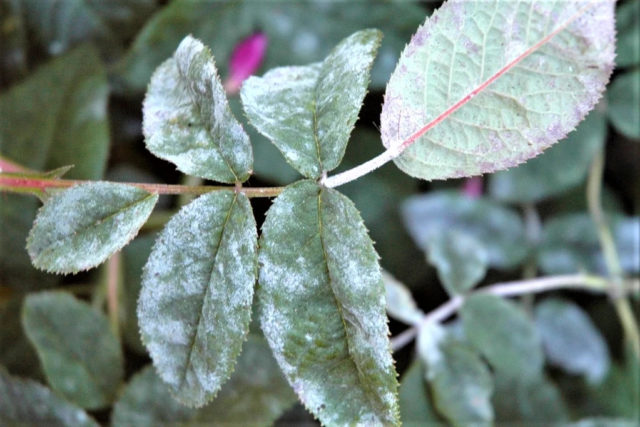
For powdery mildew, 2-3% Bordeaux liquid or 30% ferrous sulfate solution is effective
With a lack of potassium in the rainy season, the rose may be affected by black spot. It manifests itself in dark brown spots on the leaves. The affected plates gradually turn yellow and fall off.
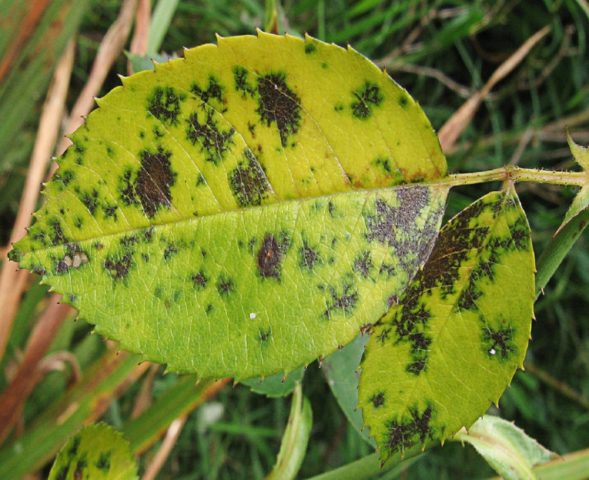
All the leaves must be collected and burned, and the bush must be treated with 1% foundationol solution or 1% Bordeaux liquid
Among the pests, aphids can often be found on the Black Prince rose.It appears in the spring, multiplies very quickly, simultaneously destroying leaf plates, young shoots and buds. If pest control is not carried out, then the pest will overwinter in the aboveground part of the bush.
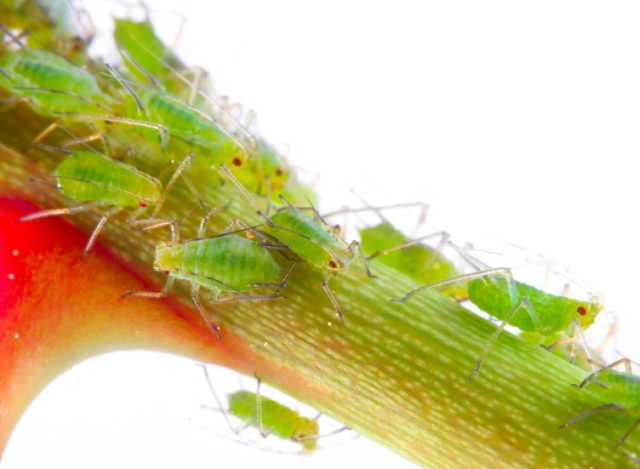
The bush should be treated three times, every 3 days with one of the insecticides: Aktara, Aktellik, Fufanon
Application in landscape design
Most gardeners prefer to plant the Black Prince rose in single compositions. The flower is self-sufficient, does not need a frame.
You can place the bush in flower beds, along garden paths. Coniferous plants planted in the background emphasize the beauty of the buds.
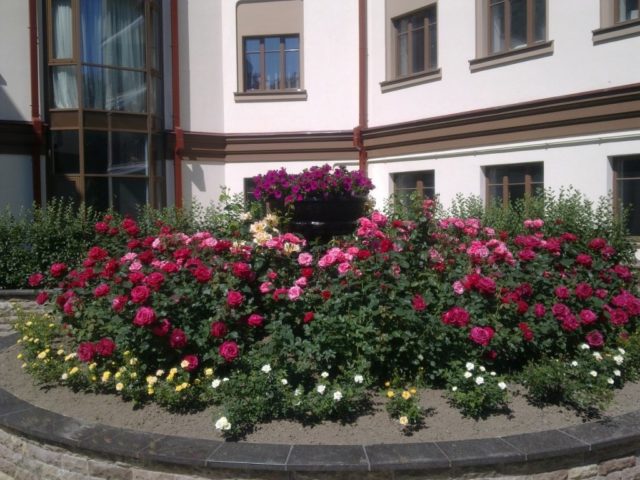
When planting several varieties of flower crops, their spreading and height should be taken into account so that the flower bed looks neat
In rosaries, the Black Prince variety looks spectacular along with flowers of light shades. Daylilies and delphiniums can be planted as companions. With the right combination, the beauty of peonies will be effectively emphasized.
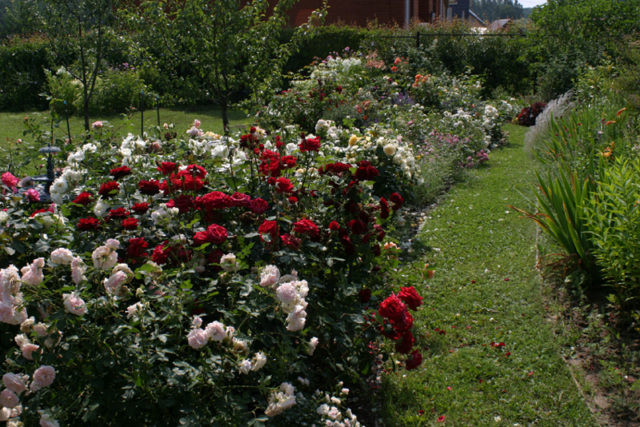
The contrast allows you to favorably set off dark roses, therefore, it is recommended to place white or cream varieties of flowers next to the Black Prince.
Conclusion
Rose Black Prince is one of the oldest and proven varieties. The plant is demanding for feeding and care, needs pruning and shelter. Subject to the rules of agricultural technology, the culture will delight the owner with abundant and long flowering, beautiful, unusual shades of buds.
Reviews of climbing rose Black Prince





